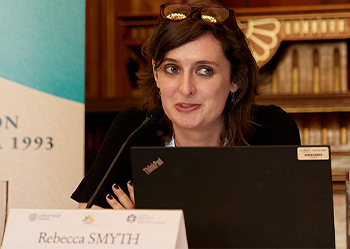University News Last updated 08 March 2024

Dr Rebecca Smyth, Lecturer in Law at Birmingham City University (BCU), is researching how feminists use human rights to advance abortion rights access.
Rebecca is working with Amnesty International to shape policy around sexual and reproductive health and rights (SRHRs).
In collaboration with two undergraduate students, one at UCLA and one at UvA, Rebecca is also working with Safe Abortion for Everyone (S.A.F.E), a network that provides abortion access to those who need it, to map out European abortion laws on paper and in practice to address barriers.
Her research titled Abortion, reproductive freedom, and sexual and reproductive health and rights: lessons from El Salvador was awarded £8,874 by the British Academy/Leverhulme Small Research Grant in 2022. Rebecca explains what she’s working on and why it’s important to keep campaigning.
“42% of women and people who can become pregnant live in one of the 125 countries worldwide where abortion is illegal. The stark reality is that if you criminalise abortion, people die. They’ll have permanent heath issues. They’ll be forced to look after children they’re not able to. Decriminalising abortion actually results in fewer abortions in the long run.
“As a feminist, I believe that people should be able to decide on their life paths.
“Although international and regional human rights systems are grounded in rights and equality, many of the principles, procedures, and legally binding documents that govern them weren’t created for and with women, the LGBTQ+ community, and other historically oppressed groups in mind, so they can’t always represent and respond to lived reality as well as they should. They’re also very slow to change.
“My goal is to understand how we can harness these systems to make them work for those who have been traditionally excluded from and oppressed by these systems.
“I’m from Ireland. I remember the case of Savita Halappanavar in 2012, who, due to Ireland's abortion legislation at the time, was refused an abortion despite experiencing an inevitable miscarriage. She died as a result. Just a few months later, in spring 2013, the case of “Beatriz” in El Salvador drew worldwide attention. She was unable to have an abortion due to El Salvador's complete criminalisation of abortion (despite the pregnancy being non-viable and continuing with the pregnancy putting her life and health at risk).
"The United Nations and human rights organisations intervened, but the Supreme Court ruled that the life of the mother couldn’t take precedent over the baby. She went into early labour, delivered a stillborn baby, and was left with permanent kidney damage, all because she was denied access to an abortion.
“Since then, my research has focused on human rights, feminist movements, and the societal, legal, and attitudinal barriers that women face on a daily basis, in every country across the world.
“I’ve explored two frameworks – international human rights law and reproductive autonomy/justice – to understand abortion access and the work we need to do to increase rights for women.
“My current research analyses what’s happening in El Salvador, an authoritarian country with one of the most restrictive abortion legislative frameworks, and the inspirational feminists creating change in response.
“In the 1970s and 80s, a vibrant feminist movement emerged in response to the vast inequalities and violations of human rights in this country. Since 2009, the complete criminalisation of abortion has become a big focus of its work, with Agrupación Ciudadana and La Colectiva Feminista being the two main organisations.
“Spanning generations, women have worked tirelessly to create access to abortion pills and knowledge at grassroots level, collaborate with transnational organisations such as Amnesty International to advocate for human and reproductive rights, and work with the Inter-American human rights system and the United Nations to lobby for an end to inequality and secure justice for women.
“In January 2024, they celebrated the success of the ‘Free the 17!’ (Nos faltan Las 17) campaign and release of women who went to prison for suffering obstetric emergencies – with some women convicted of aggravated homicide, which carries a sentence of up to 40 years.
“Many people don’t realise that abortion is still criminalised overall. In the UK, there has been an increase in recent years of women being prosecuted in England and Wales.
“As part of this project, I’m sharing the lessons learnt from the incredible Salvadoran and Latin American feminist movements via two journal articles, a book, and conference presentations.
“If I’ve learnt one thing, it’s that we have power together. When we unite, researchers, campaigners, policymakers, and human rights organisations, we can change the world.”